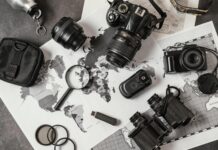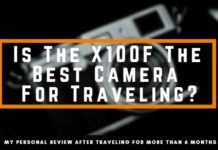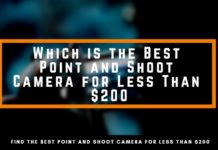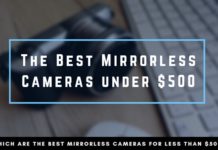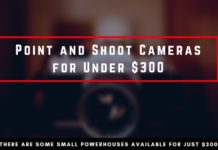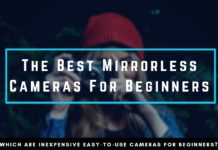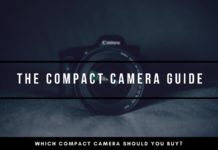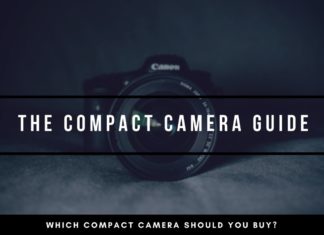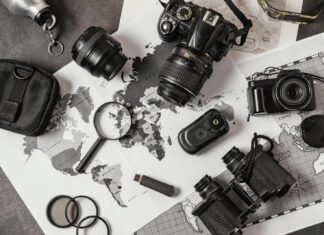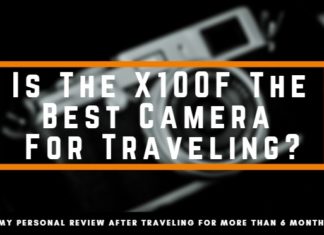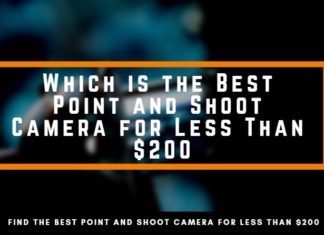Mirrorless Cameras are the future in photography and the good things is that this future doesn’t come at a great cost. Digital Cameras are so advanced, that they can deliver great images while being rather inexpensive. Good Mirrorless cameras are available for under $1.000 and You don’t really need to spend much more than that.
In the following, I want to present the best mirrorless cameras under $1.000 that I personally recommend and You should use without any cautions for Your photography.
Whether You are going on a journey and are searching for a light camera for traveling, or are more serious for a project. Mirrorless cameras under $1.000 are offering You a quality, that is not only suitable to deliver images that are looking great in Your own home, but also at exhibitions or photography magazines.
Instead of investing more money in a camera, go with a mirrorless camera for less than $1.000 and spend more money on travel experiences or other things that bring You joy.
Best Mirrorless Cameras under $1000 – Selection
Why Choosing a Mirrorless Camera
I know that there are still a lot of people out there recommending DSLRs or other cameras. DSLRs are still being sold as the miracle of photography and as cameras that give You the best image quality, the easiest way. This is more a marketing fraud and the sells of DSLRs are declining rapidly.
In comparison to DSLRs, Mirrorless Cameras have a lot of advantages that You should make use of in Your photography. The fully electronic design makes them more compact and light. Weight is a huge difference when traveling and carrying a camera for the whole day. Even when You are just doing some Street Photography, the weight difference becomes noticeable quite fast.
Another big factor is the Electronic Viewfinder. In the beginning stages of mirrorless cameras, a lot of people where very skeptical and I guess they had a point. The Electronic Viewfinder had a few hiccups. There was a noticeable lag and the resolution wasn’t comparable to the real-life optical viewfinder. The additional features didn’t really make up for these disadvantages. In modern mirrorless cameras, these problems have been overcome and the Electronic Viewfinder is a huge advantage compared to its optical counterparts now.
Even the old bulls on the digital camera market – Canon & Nikon – are funneling more resources into mirrorless cameras and are putting more emphasis on these mirrorless cameras. They know that mirrorless cameras are the future and that even the best DSLRs can’t compete with them in the near future.
With that being said, there is more equipment for mirrorless cameras available, new lenses are being added at a very high speed and overall they are the superior technology.
Here are my recommendations for mirrorless cameras under $1000.
Sony A6300
License
Features
Features
Features
Features
PRO
Fast Auto-Focus
Excellent Image Quality
Magnesium Body
4K Video including Microphone Jack
CONTRA
No Touchscreen
Slow Buffering
Let’s start this list of mirrorless cameras for under $1.000 strong and Sony has been proven to be a manufacturer who knows how to build quality cameras. Not only in the highest categories of cameras, Sony is convincing, but also in categories below $1.000, Sony is very cost efficient. The Sony A6300 is one of the best performing cameras for this price.
With over 24.2 Megapixels the camera does provide a great resolution and the quality of its images are of a really high standard. As a reminder, 24 Megapixels are more than the previous Canon 5D had and they are known to produce images that have been exhibited and printed all over the world.
In addition to the high pixel count, the sensor does also work very well in high-ISO environments. Overall, Sony did a great job packing a lot of power in this little body.
As an improvement to the A6000, the A6300 does focus more on its video capabilities. Now bringing You 4K video, the camera does also feature a microphone jack, which was missing in the previous version.
At times, the A6300 can be seen as a little too ambitious. The improved image quality does come at the cost of a slower buffering and the Wi-Fi is not really the best. If You are unfamiliar with the menu, the camera isn’t intuitive to control and the interface needs a bit of time to learn.
If You are searching for a camera that offers high-quality and are willing to invest just a little bit of time to get used to its unique menu, then this camera will bring You a lot of joy.
Sony a7
License
Features
Features
Features
Features
PRO
Very Small Body
Full-Frame Sensor
Fast Burst Shooting
Great ISO Performance
CONTRA
A little aged
Loud Shutter Noise
When You are searching for a camera to buy, it doesn’t always have to be the newest generation. There are some classic mirrorless cameras out there, that still hold a lot of value. Although the Sony A7 has been released for Christmas 2013, You can still make Yourself happy with that camera today. It is the most affordable full-frame camera You can get and the basic technology that allows You to get great pictures is still valuable as every.
It features a hybrid auto-focus which works fast and reliant in good light, has a very fast burst shooting modus and the ISO performance is great, thanks to the full-frame sensor.
Admittedly, the lifecycle of cameras is very fast and being five years old makes this camera almost a grandpa to all the other mirrorless cameras. In its core, the camera works wonderfully, but there are some minor issues that have been tweaked in newer models. The shutter is kind of noisy and if You expect a smooth and silent modern electronic shutter, then A7 is considerably louder. Nonetheless, compared to DSLRs, it is still calm and quiet. The high-ISO performance is great, but the auto-focus could do better when not being in good light conditions. At night, You are better off using a system of zone-focusing or manually focusing.
At last, it is still a full frame camera and if You value having a full-frame camera over some its age, then this camera does perform very well to this day. The fact that the price of the A7 didn’t fall off the earth after the next generations have been released does prove the point of how valuable this mirrorless camera can be.
Fujifilm X-T20
License
Features
Features
Features
Features
PRO
Fast Auto-Focus
Tiltable Screen
Easy to Use Touchscreen
A lot of Film Presets
CONTRA
Low Battery Life
The Fuji X-T20 does look very good when being in the spotlight. With that, I not only mean the retro-design body of this beauty, but also the inner values. The resolution is great with 24.3 Megapixels and is on par with the highest standards of modern mirrorless cameras.
Fuji also did a good job improving the sensor and doesn’t face some of the complaints in the past where images where too smooth, giving people almost a wax-figure look. The LCD-screen does feature a very easy to use the touchscreen and is also tiltable. You can lay down the camera, look at the LCD-screen to compose the image and get the picture without too much effort.
The downside of the touchscreen is energy that it does consume. With the X-T20 You always want to have some spare batteries at hand, or You might find Yourself without any energy at the shooting location.
If You are willing to add some extra batteries on Your list together with the X-T20, this camera does not only give you great images, but also a 4K video mode. Are You not a fan of post-processing? Then the X-T20 does also come with a lot of film-presets that can enhance the JPEGs that come straight out of the camera.
Fujifilm X-A5
License
Features
Features
Features
Features
PRO
Very Affordable
Good Self-Portraits
Better Battery Life
High-Quality Lenses
CONTRA
No Viewfinder
Unreliable White-Balanc
Being released in early of 2018, the Fuji X A-5 is one of the newest additions to the Fuji family. That doesn’t mean that the introduction has to be expensive. Priced at lower than $600, the A-5 is very affordable, yet does include most of the important features for modern cameras.
Are You traveling and want to include all of Your friends in the picture as well? Then this camera is great for having a screen that turns all the way to the top and can face the front. With a wide-angle lens, You can take self-portraits that will blow away Your peers on Facebook or Instagram.
But in all seriousness, the camera is not only good for doing some selfies, but also for photography and even videos in general. The camera does feature Wi-Fi and a better battery life.
The tiltable screen is one of the main features and this meant for Fujifilm, that they didn’t want to include an electronic viewfinder as well. This means that You have to always use the screen for taking pictures, which can take away some of the joy of looking through a viewfinder.
If You can live with the fact that You won’t look like a “real” photographer while using the LCD-screen for the photos, then this camera is definitely a good option to look at. With long Battery life, high-quality lenses and being available for under $600, this camera is everything You might look for in mirrorless cameras under $1000.
Olympus OM-D E-M5 Mark II
License
Features
Features
Templates
PRO
Magnesium Body
Tiltable Screen
Hi-Res Modus
CONTRA
High ISO Performance
The Olympus OM-D E-m5 mark II doesn’t seem to have the highest resolution on this list of mirrorless cameras under $1000. With 16 Megapixels, most of its competitors are able to offer some more. Claiming that the OM-D E-m5 has only 16 Megapixels is just partly true. The camera does have a feature that allows You to take pictures at a very high resolution, surpassing the 16 Megapixels easily.
Another big plus of this otherwise tiny body is the generous electronic viewfinder. Most mirrorless cameras are designed to be as small as possible and while this does have some advantages, the electronic viewfinders can be too small at times. If You are wearing glasses You will really be thankful for a bigger viewfinder that You can use without removing Your glasses.
While the design of the electronic viewfinder is great, the dials can be a bit clunky to use and are not very well placed. Since the camera is very small and can happen quite often that You will touch them without actually wanting to.
The OM-D E-m5 is also one of the few cameras that feature in-camera image stabilization which makes it possible for You to shoot very long exposure handheld. If You have the time to utilize the high-res modus, for example for landscape or architecture photography in combination with a tripod, then this camera can do wonders for You.
Olympus Pen-F
License
Features
Features
Features
PRO
Very Sharp
Tiltable Screen
Touchscreen and Wifi
CONTRA
No Ultra HD Video
The Pen-F continues the tradition of the OM-D E-5 but does a lot of things better than its counterpart. It has more megapixels, which is better to use for doing photography at a very fast speed. In addition to the higher megapixel count, the auto-focus is also one of the fastest available.
If You have a look at the design of the camera, there are a lot of improvements while keeping its vintage style. The dials have been moved and are better to use, while not being in the way. One of the highlights is the new and improved electronic viewfinder, which is one of the sharpest on the market.
The Pen-F does focus completely on photography and in consequence, You are not able to record videos in 4K resolution and the camera doesn’t have any microphone or headphone jack. So if You are valuing the video functions very highly, there are better options available.
On the other hand, if You are willing to sacrifice a bit of video quality for still images. You can get high-quality images with the help of this small camera. There is also a huge selection of lenses that can You combine with this camera.
RicohGR II – Review
License
Features
Features
Templates
PRO
Excellent Image Quality
APS-C Sensor
Very Compact
CONTRA
No Viewfinder
The RicohGR is still one of my favorite Street Photography cameras and is also very well deserved on this list of mirrorless cameras under $1000. This camera doesn’t fool around, it knows what it can and does focus on it.
The camera is clearly geared towards photographers or travelers that simply want to focus on creating great images. There aren’t too many features or other options that can distract You from photography. Instead of having to worry about lenses, the RicohGR comes with a wide angle fixed lens. Due to that decision, the camera can be carried in every pocket and is optimized towards great quality.
Sadly, the camera doesn’t have any electronic viewfinder and since the wide angle lens is fixed and doesn’t have any zoom option, You have to be confident in using only that lens. You can, however, purchase an electronic viewfinder and add it to the camera.
The RicohGR II is great for Street & Travel Photography. You can control the camera easily with one hand since all of the dials are placed conveniently. This does allow You to even try some off-camera flash photography. I recommend the camera to everyone who is seeking for a simple powerful mirrorless camera and doesn’t need any other gimmicks that only increase the price.
Samsung NX500
License
Features
Features
Features
Features
PRO
28 Megapixels
High ISO-Performance
Very Good Dynamic Range
Good Ergonomics
CONTRA
Too "Smooth" at High ISO
No Built-in Flash
The Samsung NX500 does have phenomenal technical specifications. Coming in with over 28 Megapixels the NX500 does have a great image quality in good light. With the screen being tiltable and able to face the front, it is a good option to carry with You on vacation and take pictures with Your friends.
In addition to the excellent image quality, the NX500 does offer a 4K video modus and the videos are crisp as they should be. Therefore, the camera can also be used to take videos of Yourself and document all the exciting stories that You are willing to share.
One downside of the 28 Megapixels, however, is the manipulation in the high-ISO range. When using the camera in high-ISO ranges, the noise level is very low, but this is only the result of the camera filters. They smoothen the images with the goal of reducing the noise, which can be a bit too strong.
To sum it up, the Samsung NX500 has one of the best technical details available and is priced just short of $1000, it is a very good choice for photographers who are searching for a versatile camera that does great in all aspects.
Panasonic G7
The Panasonic Lumix G7 is the most inexpensive camera on this list of mirrorless cameras for under $1000. In combination with the kit lens, the camera does even come in under $500.
Although being the most affordable camera, the Lumix G7 does include features that You wouldn’t expect in a camera of this kind. You are able to shoot videos in full 4K resolution, the camera is very lightweight and does even have a tiltable LCD-screen.
For some users, the camera might even be too small and the haptic isn’t the best. The in-camera JPEGs and color profiles are also not the best, which doesn’t matter if You are using the camera in RAW-mode, but if You are depending on the JPEGs, then You may be not content with how the pictures look like.
The camera is a great entry option in the world of changeable lens cameras. If You want to upgrade the camera, You can also carry over the lenses and use it in combination with a more powerful Olympus camera body.
Panasonic G85
License
Features
Features
Features
Features
PRO
4K Video Modus
Very Good High-ISO Performance
Excellent Auto-Focus
Good Dynamic Range
CONTRA
Risk of Moiré
Electronic Viewfinder struggles in low Light
The Lumix G85 is a great progress compared to its previous generation. The core hasn’t changed much and the camera is still sporting a 16 Megapixels sensor. That doesn’t sound like much anymore in this day and age, but the design of the sensor performs really well in low light and offers a good dynamic range.
In addition to its previous models, the image quality hasn’t changed much, but the added 4K video modus and the more robust camera body does have its perks. The G85 is one of the few camera models that are actually splashproof and should be able to do well during travel. Therefore, it is also a great camera for hiking.
Although the camera does have a good dynamic range, the electronic viewfinder does seem to struggle a bit in bad light conditions. When using the continuous auto-focus, the burst mode is also limited to 6 images per second.
Those negative points aren’t really limiting its strengths, that clearly come into play when looking at its sturdy design. With this camera, You get a very robust body that does produce very well images, even in bad light conditions.
Mirrorless Cameras Explained
Instead of having a physical mirror that is responsible for directing the light and watching the scenes through the viewfinder, mirrorless cameras are using the information that is coming from the sensor and are displaying them on an electronic viewfinder.
This is the main difference between mirrorless cameras and DSLRs. Mirrorless cameras are less complex to design and this allows them to be lighter and smaller. Both factors that I very much appreciate when doing Street Photography or are traveling.
Mirrorless cameras are the future for me and the great thing is that they aren’t really expensive. The technology has very much matured and isn’t in its early stages anymore. The quality is better than DSLRs and manufacturers are putting more and more effort in increasing the equipment for mirrorless cameras.
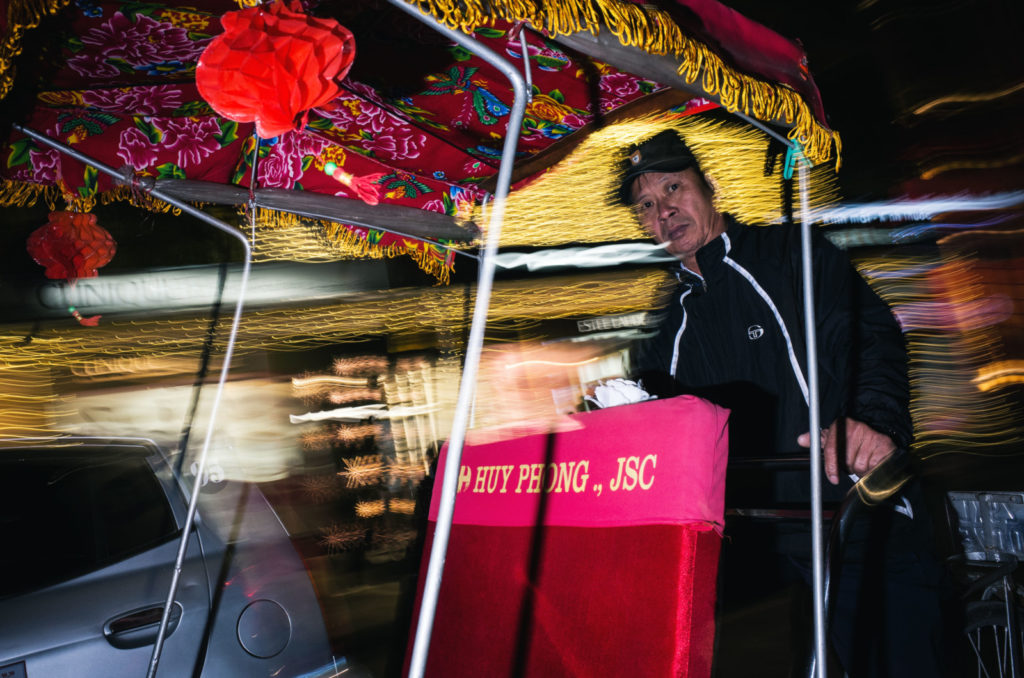
The Electronic Viewfinder
Many years ago when mirrorless cameras have been introduced for the first time, the electronic viewfinder has always seen as a bit lackluster. The resolution wasn’t very great and didn’t compare to the “real-life” of the optical viewfinder. Since details can get lost when looking through a low-resolution viewfinder, many photographers were turned off by this technology.
In addition to this problem, the electronic viewfinders were also facing issues with lag. Often times, the picture in the display wasn’t refreshed quickly enough when moving the camera.
Those were problems of the past. Nowadays, manufacturers put a lot of emphasis on creating high-resolution electronic viewfinders that are an advantage compared to optical viewfinders.
Electronic viewfinders are able to display a lot more information in the viewfinder. Since the information are the same that also are hitting the sensor, You get a preview of the final image. You are able to get a live preview of the exposure and the depth of field. Furthermore, the electronic viewfinder is customizable and able to display a lot more data.
When using old vintage lenses, You can use additional focusing features and display them in the electronic viewfinder. This way, You are able to hit the focus more reliably.
Battery Life
One drawback of the many features of the electronic viewfinder is the need for power. The electronic viewfinder is a display which needs more energy. Overall the battery life is very lackluster and although the cameras are getting better and batteries more efficient. You should make sure to always have one or two spare batteries with You.
From my own experience, You don’t need the original batteries which can be quite expensive, sometimes coming close to $50. The original batteries that came with my RicohGR gave up very quickly. Contrary to the original ones, the third party batteries, that cost may just a third of the original ones are still doing pretty well.
Video Recording
Not only for pictures, but also for video recordings, mirrorless cameras are working very well. Whereas DSLRs have just recently caught up to the trend of focusing more on the video functions, mirrorless cameras were focused from the start to also include high standards of video recording.
Again the weight is one of the best features of the mirrorless camera as it does allow You to hold the camera not only for a very long time but also at difficult angles without getting too tired.
Some of them even include microphone and headphone jacks that let You make sure that the sound is optimal also.
Traveling
Because of these characteristics of the mirrorless cameras, they are also ideal for traveling. They are small, can be put in camera backpacks and it isn’t tiring wearing them all day. From their appearance, they also don’t look like big intimidating DSLRs that normally only paparazzi are carrying.
During my travel through Southeast Asia, a lot of people were just curious what kind of camera that is because it looked different from the standard cameras they saw. Some even assumed I would be using an analog camera.
All of those things help to get closer to people and maybe even start a chat.




